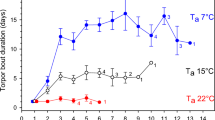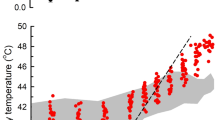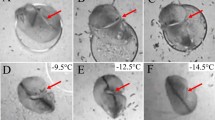Abstract
ALTHOUGH reptiles in a laboratory cage may show feeble powers of thermoregulation, it is now known that, when active in natural conditions, their body temperature is often regulated by behavioural means at a thermal level higher than that of many mammals1. Tortoises are no exception and sun themselves when the air is cool. Experiments on young desert tortoises, Testudo sulcata Miller (= T. calcarata Schn.), have shown that water loss by evaporation increases greatly in dry air at temperatures above 40°–41° C. At ambient temperatures of 55° C the body temperature rises rapidly to about 40.5° C, at which level it is maintained by copious salivation which wets the head, neck and front legs. Although they do not usually take water when supplied with green food, these tortoises drink deeply after such experiments.
Similar content being viewed by others
Article PDF
References
Schmidt-Nielsen, K., and Dawson, W. R., Adaptation to the Environment: Handbook of Physiology, Sect. 4, 467 (Amer. Physiol. Soc., 1964).
Author information
Authors and Affiliations
Rights and permissions
About this article
Cite this article
CLOUDSLEY-THOMPSON, J. Thermoregulation in Tortoises. Nature 217, 575 (1968). https://doi.org/10.1038/217575a0
Received:
Issue Date:
DOI: https://doi.org/10.1038/217575a0
Comments
By submitting a comment you agree to abide by our Terms and Community Guidelines. If you find something abusive or that does not comply with our terms or guidelines please flag it as inappropriate.



